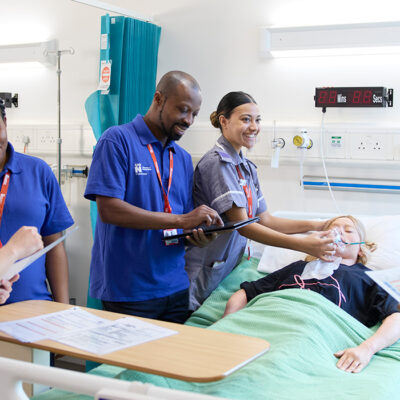

Health Sciences BSc (Hons)
Key Facts
-
UCAS Code
BSc: L400
BSc with Foundation: L401 -
Duration
Full Time: 3 years
Full Time Foundation: 4 years
Part Time: 4 - 6 years
-
BBC at A Level or,
DMM at BTEC -
Full Time: £9,535
Part Time: £1,585 (per 20 credits)
Integrated Foundation Year: £9,535
Updated 09/12/2025
Updated 09/12/2025
Get in touch
UK STUDENTS ENQUIRIES
study@northampton.ac.uk
0300 303 2772
INTERNATIONAL STUDENTS ENQUIRIES
Our Health Sciences BSc degree offers students an in-depth study of the holistic nature of health and disease and a detailed coverage of the integrated health disciplines.
This Health Sciences Degree incorporates in-depth study into: health psychology, health sociology, medical anthropology, human biology and physiology, human nutrition, public health, health promotion, health policy and biomedical ethics.
The programme takes as its point of departure the WHO definition of health that states that ‘health is a state of complete physical, mental and social well-being and not merely the absence of disease’ (WHO 1947).
For overall student positivity – National Student Survey 2025
Overall for Health Professions
For Career after 15 months for Health Professions
NSS Calculations are based on Office for Students (OfS) data from the average positivity score. Guardian Data from the 2026 Health Professions Subject table.
Highlights
- This health sciences programme highlights the interdisciplinary and multi-factorial approach to understanding health.
- Assesses current debates and contemporary health issues at local, national and global level.
- Combines the biological and social sciences to develop evidence-based solutions to health issues
- Opportunities to develop an awareness of both subject-specific and transferable skills
- Develop critical evaluation and appraisal, research and communication skills
- Guaranteed paid internship with the Northampton Employment Promise.
- HP Laptop and software included with this course. Terms and Conditions apply
Entry Requirements
A typical offer for our Health Sciences course would be:
- BBC at A Level or,
- DMM at BTEC/Cambridge Technical or,
- Merit at T Level
The University of Northampton welcomes international applicants and applications from students with a range of non-traditional educational or professional qualifications, and also applications from students with a mix of A levels and BTEC/Cambridge Technical qualifications.
For more information on how to make an application, please visit our How to Apply page.
If you are an International student and would like information on making an application, please see our How to Apply page.
Admission to this foundation course is normally:
- DEE at A Level or,
- MPP at BTEC or,
- Pass (D or E) at T Level
However, we would also like to hear from you if you have professional or industry experience instead, a range of other qualifications or self-developed subject knowledge that relates to the course you wish to study.
For more information please visit our Integrated Foundation Year page
All International and EU students applying for a course with us must meet the following minimum English language requirements:
- IELTS 6.0 (or equivalent) with a minimum of 5.5 in all bands
for study at undergraduate level
For information regarding English language requirements at the University, please see our IELTS page.
What You'll Learn
This Health Science Degree adopts an interdisciplinary approach to the study of health, illness and disease. Students will be introduced to the many interlinked factors that contribute to the health status of individuals and populations. These factors include the biological, psychological, sociological, political and environmental factors that influence health. The precise topics covered will change from year to year to reflect contemporary issues and debates in health, thus ensuring health studies students are always engaging with up to date material.
As students progress from year 1 to year 3, they will learn critical evaluation and appraisal, research and communication skills, and how to construct and defend an academic argument.
The purpose of this module is to explore and contextualise the history of the body, health and healing and its contemporary parallels and relevanceThe module will investigate how ideas about body and healing interacted with, and were embedded within, historical understandings of gender, society and culture.
The purpose of this module is to understand health, wellbeing, illness and disease in a social, cultural and environmental context
The purpose of this module is to introduce the student to the basic principles and concepts of physiology, and to develop an understanding of how different systems are integrated to produce homeostasis.The focus will be on human physiology and will study the form and functions of the major body systems.
The purpose of this module is to build a foundation of nutrition knowledge, introducing the nutrients and current recommendations for good health across the lifespanIt will explore the sources of the nutrients in the diet and how the body incorporates themStudents will learn how to investigate the consequences of nutrient intake gaining a fundamental understanding of Nutrition research and how diet relates to health.
This module introduces students to the essential theories and concepts in healthThe module covers the major concepts used in health research, health policy and health promotionEach session will focus on a different concept and students will explore the definition and application of each conceptConcepts that are used in measuring the health of individuals and populationsIt also covers the concepts that are used in monitoring changes in health status over time and those used to compare the health status of people living in different locationsBy the end of the module, students will have a vocabulary of health terminology that they will use and apply in all level 5 and 6 modules in Health Studies.
The aim of this module is to explore the achievements and challenges in global healthStudents will explore historic and contemporary issues in global health and will examine the policies and strategies that have been used to address global health emergenciesStudents will become familiar with the government and non-governmental agencies that work cooperatively to achieve advances in health for local and global populations.
Please note the modules shown here relate to the academic year 25/26. The modules relating to the academic year 26/27 will be available from June 2026.
At the University of Northampton, everything we do, from funded trips to paid internships, is to give you everything you need to make a difference when you leave.
If you join our full time Health Sciences course, you will receive a laptop when your course begins*. The laptops are built to a bespoke custom specification ideal for use in the seminar room, collaborative group work or studying at home.
Whatever your ambitions, we’re here to help you achieve them. We’ll support you to identify the skills you’re learning during your course, find your strengths and secure practical experience so that when it comes to applying for jobs or further study in Health Sciences you’ll feel confident in standing out from the crowd. We’ve created the Northampton Employment Promise because we are so confident that if you focus on your studies and complete one of our awards you’ll be highly employable by the time you graduate. Putting you in a great position to secure employment or continue your studies.
To check out the full list of perks, visit our Student Perks page or dedicated International Perks page.
*UK fee payers only (see Terms and Conditions for further details).
The Integrated Foundation Year (IFY) offers a new and exciting route into studying at the University of Northampton, attracting ambitious and driven students who are willing to learn and advance.
If you have non-standard qualifications or do not quite meet the admissions requirements we can offer you a fantastic opportunity to study a four year programme which includes an Integrated Foundation Year. The Integrated Foundation Year will help you develop the theoretical/practical and academic skills you need, in order to successfully progress to the full award.
Our four-year courses will enable you to successfully follow the degree pathway of your choice while gaining essential study skills. The foundation year of your chosen degree will be studied on a full-time basis and is aimed at supporting the transition to higher education. Years two, three and four are then studied as a standard degree programme.
Why study Health Sciences at degree level?
If you are aiming for a career in the health sector, then completing a Bachelor of Health Sciences at The University of Northampton will provide you with the necessary skills for pursuing a highly rewarding career in the health industry, including public health, health promotion, health improvement and health policy.
By studying Health Sciences at degree level, you will develop the critical research and analytical skills required for a career in the health sector, as well as the skills that will prepare you for a postgraduate research degree.
How will I be taught on the BSc Health Sciences degree?
Students will be taught using a range of teaching methods and styles including lectures, seminars, and technologically enhanced interactive activities. In all modules, the emphasis is on active blended learning, student participation and student engagement.
How will I be assessed on the Health Sciences course?
Students will be assessed using a variety of assessment strategies including essays, reports, presentations, posters and exams. In all modules, at all levels, the assessment is aligned with the learning outcomes.
In the final year of the Health Sciences degree, students complete a dissertation on a health topic of their choice. This is an independent research project completed with support, guidance and supervision from academic staff.
Are there any specialist facilities and features?
- The BSc Health Sciences programme is delivered by a dedicated multidisciplinary team with expertise in the areas of sociology, psychology, physiology, biology, nutrition and ethics.
- We adopt the philosophy that health and illness are socially and psychologically, as well as ethically, constructed.
- Our teaching and research facilities enable all of our students to learn their skills in a supportive environment.
- Our Additional Student Support and Inclusion Services Team (ASSIST) works with students with disabilities to help achieve their full potential and to promote equal opportunities.
- Library and Learning Development support available.
- Careers and employability advice and guidance.
Fees and Funding
2025/26 Tuition Fees
- UK – Full Time: £9,535
- UK – Part Time: £1,585 per 20 credit module
- UK – Integrated Foundation Year: £9,535
- International – Full Time: £15,700
- International – Integrated Foundation Year: £15,700
Fees quoted relate to study in the Academic Year 2025/26 only and may be subject to inflationary increases in future years. UON will adjust UK fees annually in line with Government Policy.
There are no additional costs for this course for students beginning their studies in September 2025. Should this change, applicants and students will be contacted by the university with details of the costs.
For information on the scholarships available to you, please see our scholarships page.
Fees quoted relate to study in the Academic Year 24/25 only and may be subject to inflationary increases in future years.
- UK – Full Time: £9,250
- UK – Part Time: £1,540 per 20 credit module
- UK – Integrated Foundation Year: £9,250
- International – Full Time: £15,200
- International – Integrated Foundation Year: £15,200
Careers and Employability
We offer an innovative approach to enhancing the employability of our BSc Health Sciences graduates. We’ll help develop your awareness of your subject-specific skills, transferable skills and provide you with a reflective approach to learning.
Our course includes career planning aspects and opportunities that will allow you to develop an awareness of both subject-specific and transferable skills. We are confident that this experience gives our graduates an advantage when applying for employment or master’s training.
Graduates in our Health Science courses will have the knowledge, skills and competency to work in diverse roles such as working for the National Health Service, Public Health and Public Health England, health promotion, health journalism, the pharmaceutical sector, and education. Many graduates are likely to progress onto higher research degrees such as a Masters degree or further specialist degrees such as a Postgraduate Certificate in Education.


